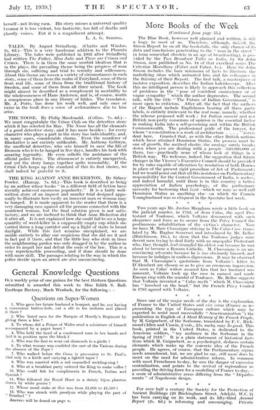More Books of the Week
(Continued from page 55.) The Blue Book, however well planned and written, is still a bogy to most of us. Therelbre, although, indeed, the Simon Report be on all the bookstalls, the only chance of its data and conclusions penetrating to the '' man in the street " (a term somewhat obsolete in an age of broadcasting), is pro- vided by the Two Broadcast Talks on India, by Sir john Simon, now published as No. 18 of that excellent series The Criterion Miscellany (Faber and Faber, Is.). Here Sir John Simon includes the bare minimum of facts to illustrate the underlying ideas which animated him and his colleagues in the framing of their Report. The first talk, a masterpicee of incisive exposition, describes the Indian kaleidoscope. After this no intelligent person is likely to approach this collection of problems in the " pose of confident o lllll iscience or of vague sympathy" which the author deprecates. The second talk, with the title " The Future of Indian Government," is more open to criticism. After all, the fact that the authors of the Report include Englishmen bearing all three party labels, is entirely irrelevant to the real issue, namely, whether the scheme proposed will work ; for Indian consent and not British non-party consensus of opinion is the essential factor in making India into a self-governing unit within the British Commonwealth. The professional pride of the lawyer, for whom " a constitution is a work of architecture . . . . " is evi-
dent here. Granted that, as with the other British nations which have attained Dominion Status, the process must lw one of growth, the method elastic, the analogy surely breaks down when you are dealing with a people —320,000,000 of them, too—practically none of whom look at things in a British way. We welcome, indeed, the suggestion that future changes in the Viceroy's Executive Council should be provided for by rules capable of alteration by resolution of both Houses in place of the present rigid procedure of Act of Parliament ; but we would point out that all this insistence on Parliamentary responsibility for the Central Government of India, is useless, and indeed harmful, until there is in this country a better appreciation of Indian psychology, of the preliminary necessity for bestowing that izzat—whieh we may as well call Dominion Status as anything else—on which Sir Francis Younghusband was so eloquent in the Spectator last week.
* * *




































 Previous page
Previous page